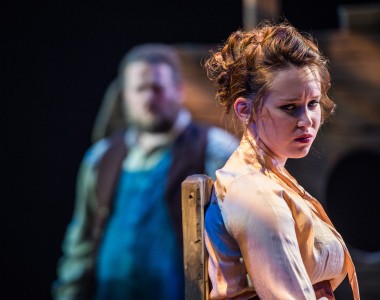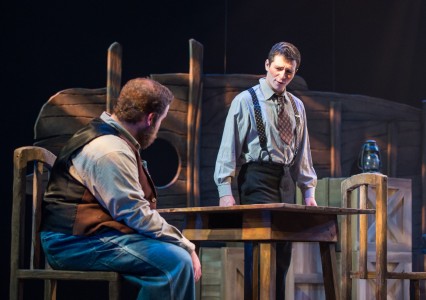
Thursday, Oct. 9 marked the opening for the Grinnell Theatre and Dance Department’s main stage production of “Anna Christie” in Roberts Theatre. The production is a classic Eugene O’Neill play, written in the 1920s, and in many ways mirrors the original staging. However, one thing about Grinnell’s production distinctly sets it apart: The Ningbo Yongju Opera Troupe from China. This opera troupe will be performing its own production of Anna Christie on the same set. The Chinese ensemble will perform today, Friday, Oct. 10 at 7:30 p.m. and tomorrow, Saturday, Oct. 11 at 2 p.m.
Professor Emeritus Sandy Moffett, Theatre and Dance, has been working in conjunction with a friend in China to have a dual performance, Grinnell and Chinese Opera, of an O’Neill play for several years.
“I’ve been to China a lot of times. I really like China and I’ve been there for several different reasons. While I was there, I met a man name Liu Hai Ping who was at that time the Dean of Foreign Studies School and a professor, but he’s also China’s leading O’Neill scholar … Not too long after, I taught at Nanjing. He sent me an email explaining that there was a company doing an adaptation of an O’Neill play and asked if I would like to see it. I said yes, I would, and managed to get myself a ticket. I was really impressed. What I wanted to do at that time was similar to what we’re doing now,” Moffett explained.
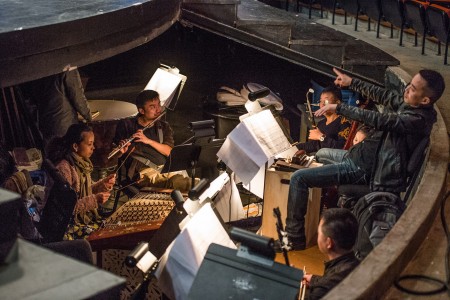
Moffett prepared for the Chinese opera company to come in October of 2001. They were going to come and perform “Desire Under the Elms,” and so Moffett directed a version of it in Grinnell. Then 9/11 happened and the Chinese government wouldn’t let the company come over. Grinnell performed the play independently and then a year later, the Chinese company came to Grinnell.
“I’ve been in contact with Liu Hai Ping, and he sent me another email saying that a company was doing an O’Neill play,” Moffett said. “This was two years ago, a year ago from this past March, I went to go see their production and then started negotiations after that point. I talked to him about what we could maybe do to make it more accessible to an American audience. From that point on, we worked on getting letters of invitation and the other things they needed, and making arrangements here.”
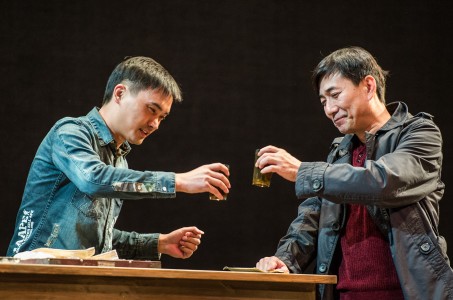
On Wednesday night, Oct. 8, 27 Chinese performers arrived in Grinnell, ready to rework their production to fit in the Roberts Theatre. Moffett said he is very excited and recommends that everyone come see the Chinese version as well as Grinnell’s version.
When asked about differences between the two performances Moffett said, “First of all it’s an opera, second of all it’s a Chinese opera. Of course the style is very different, but they’re using the same set. We didn’t really have time to build two sets, or the room to store them, so theirs will be decorated to look more Chinese, and ours is decorated to look like a seedy American bar.
One thing that I wanted to do because of the Chinese Opera coming, which will be a drastic difference from O’Neill’s original Anna Christie, I wanted to do a straight production. So in some ways, I’ve done it in the way it might have been done. From the staging of it, the use of the curtain, the set—it’s kind of a four-wall set—and I wanted to do it in a straightforward way. I haven’t really done any show in a straightforward way, so it was interesting doing it that way. I think that it suits the play. I can’t really imagine doing it any different. I probably would not have directed this play if it had not been for the China project. I’m a big O’Neill fan, it’s just not one of my favorite of his plays.”
Moffett is very proud and impressed with his cast and production team. Although Anna Christie was not Moffett’s favorite O’Neill play, he’s grown much fonder of it.
“I’ve really gained a lot of respect for the play in the process of working on it, and as always when I direct a play, I learn a lot from the people who play the roles. It’s a solid cast, and it’s been a lot of fun,” Moffett said. “I’ve been astonished by the three leads. I mean, they’ve really taken the ball and run with it. I can’t take much credit for what they’ve done. We’ve given them the stage and they’ve taken it. Particularly with a play like this, the movement has got to come from the character. What you really don’t want to do is make the character move.”
Roberts is a beautiful theatre, and Moffett and his crew have taken full advantage of its potential. The stage is dynamic without being heavy-handed, and the costumes are stunning without distracting from the performances of the actors. Erin Howell-Gritsch, Theatre and Dance, worked long and lovingly on the costumes, sewing, pulling and buying, and it shows.
“It’s a really specific look—it’s pre-suffragette but post-Gibson. It’s that little window of time where skirts were kind of like dirndls and there were stripes, a lot of green and blue and purple,” Howell-Gritsch said. “Interestingly, the patterns that I used had really no directions, and it’s not really a period that I’ve done before, so it was kind of a learning experience. It’s a great period and it’s good for the actors—easy to move in.”
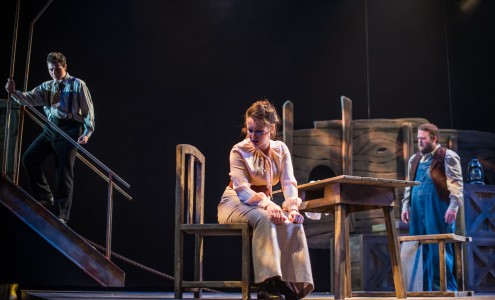
Both performances should engage and wow the audience. The actors are committed and the production is wonderful. If the weekend allows it, students, faculty, staff and community members should try their best to see both of the companies in Anna Christie.
“I’m not sure that there’s any one thing to look for, I think that the idea is to see how a different culture and a very different style take this play and make it into their own. What’s interesting to me … is that this company is a regional opera company in a big city and their style is very much ‘opera for the people.’ There’s nothing particularly classical about it,” Moffett explained. “Usually there’s a lot of big acting, big costumes and acrobatics … The group that I brought over is doing it in quite a modern style. It’s set in the 1920s but they don’t have the acrobatics or classical costumes. They do it in period costumes. It shows a progression like you might see in western opera—classical to contemporary, but still opera. So hopefully people will come and find it interesting.”
